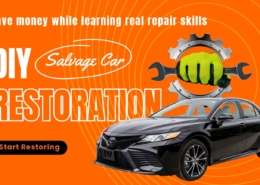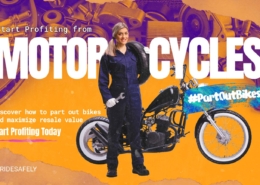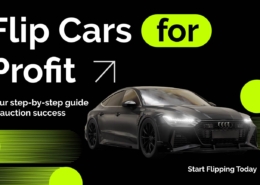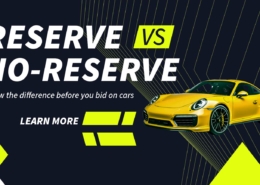 https://auction.ridesafely.com/images/2025/10/diy-salvage-car-restoration-save-money-skills-banner.jpg
865
1440
RideSafely
/images/2025/01/ridesafely-logo.svg
RideSafely2025-10-03 13:53:192025-10-03 16:36:26How to Save Thousands Restoring Salvage Cars Yourself
https://auction.ridesafely.com/images/2025/10/diy-salvage-car-restoration-save-money-skills-banner.jpg
865
1440
RideSafely
/images/2025/01/ridesafely-logo.svg
RideSafely2025-10-03 13:53:192025-10-03 16:36:26How to Save Thousands Restoring Salvage Cars YourselfPurchasing vehicles from salvage auctions offers lucrative opportunities for dealers, rebuilders, and individual buyers alike. However, navigating salvage auctions demands strategy, due diligence, and smart decision-making to secure the best deals without costly mistakes.
This guide walks you through the critical steps to win at salvage car auctions while protecting your investment.
Understanding the Salvage Auction Landscape
Salvage car auctions primarily feature vehicles that insurance companies have declared a total loss due to accidents, theft recovery, flood damage, or other incidents. These vehicles are sold at significantly reduced prices but may require substantial repairs.
The three most common types of salvage auctions include:
- Insurance Auto Auctions (IAA): Specializes in insurance-claimed vehicles.
- Copart Auctions: Offers a broad inventory, including insurance salvage, bank repossessions, and dealer consignments.
- RideSafely: Provides free public access to vehicles from Copart, Insurance Auto Auctions, and many others without the need for a dealer license.
Buyers must differentiate between:
- Clean Title: Vehicles with clean titles can generally be registered without issues. However, please note that any vehicle purchased through a salvage auction may be reclassified as salvage under NMVTIS regulations. In such cases, you would need to complete a local reconstruction process to obtain a rebuilt or reconstructed title. While this situation is rare, it is important to be aware of the possibility and prepare accordingly.
- Salvage Title: Vehicles that are often repairable but require inspection and repairs before being roadworthy.
- Certificate of Destruction: Vehicles are only suitable for parts and cannot be legally registered for road use.
Salvage car auctions offer a diverse selection, from clean-title theft recoveries to heavily damaged rebuild projects. Explore the Diverse Range of Vehicles Available at RideSafely to discover all the available options and start planning your purchase strategy.
Preparing for a Salvage Auction: Research is Non-Negotiable
Before bidding, comprehensive research is critical:
- Review Vehicle History Reports: Services like Carfax and AutoCheck reveal past accidents, maintenance records, and ownership history.
- Decode the VIN: Check manufacturer recalls, specifications, and accident history.
- Understand Damage Codes: Auction listings typically include standardized damage descriptions like “Front End,” “Rear End,” or “Mechanical Damage.” Understanding Damage Codes: A Buyer’s Guide to Auto Auctions can help you make sense of these crucial details.
- Assess Auction Fees: Factor in buyer fees, storage fees, and documentation charges that can significantly impact total purchase cost.
Key Pre-Auction Checklist
| Step | Action |
|---|---|
| 1 | Identify Target Vehicles |
| 2 | Research VIN and History Reports |
| 3 | Evaluate Damage and Repair Feasibility |
| 4 | Calculate All Costs Including Fees |
| 5 | Set Firm Maximum Bid Price |
Setting a Firm Maximum Bid: Discipline Wins
Auction excitement can easily inflate prices beyond reason. The most successful buyers enter every auction with a firm, pre-determined maximum bid based on:
- Estimated repair costs
- Current market value of the repaired vehicle
- Title branding impact on resale value
- Transportation and registration expenses
If you’re looking to take advantage of the best deals, remember you can Buy Cars at Wholesale Auctions: No Dealer License is Required through RideSafely, opening the door to major savings that would otherwise be limited to licensed dealers.
Overbidding erases potential profits and increases financial risks. Emotional bidding has no place at salvage auctions.
Inspecting Salvage Vehicles: What to Look For
If physically inspecting the vehicle is possible, prioritize the following:
- Structural Integrity: Check for frame damage that may be costly or impossible to repair.
- Mechanical Systems: Verify engine, transmission, electrical systems, and suspension components.
- Airbags: Deployed airbags add significant repair costs.
- Rust and Corrosion: Especially critical for flood-damaged cars.
- Interior Condition: Mold, mildew, or foul odors indicate deeper issues.
Where in-person inspection is impossible, request additional photos, videos, or third-party inspections if the auction allows.
Common Pitfalls That Can Cost You
Winning a salvage auction is not the same as making a profitable purchase. Avoid these common pitfalls:
- Ignoring Frame Damage: Frame repairs are complex and often never restore original safety.
- Underestimating Repair Costs: Unexpected expenses frequently derail profit margins.
- Misjudging Title Issues: Some states impose restrictions or rebranding that lower resale value.
- Neglecting Transport Logistics: Towing and shipping can significantly inflate costs.
- Overlooking Auction Fee Structures: Always understand the buyer’s premium and other charges.
New buyers often learn these lessons the hard way. To accelerate your learning curve while still making smart purchases, check out Salvage Car Auctions – Turn Profits While You Learn for strategic advice.
Salvage Auction Bidding Strategies That Win
Smart buyers employ specific bidding tactics:
- Start Low: Let competitors expose their willingness to overpay.
- Stick to Your Limit: No vehicle is worth exceeding your calculated bid ceiling.
- Bid Late: Place bids closer to the end in online auctions to prevent early price inflation.
- Use Proxy Bidding: Set a maximum proxy bid to avoid emotional bidding wars.
- Consider Less Popular Models: Highly sought-after models sell above reasonable repair cost thresholds.
Hidden Costs in Salvage Purchases: Plan Ahead
Beyond winning bids and repair estimates, plan for these additional costs:
- Title and registration fees
- Emissions testing and inspections
- Taxes based on the winning bid amount
- Professional appraisal services (where required for insurance)
- Transportation from auction yard to repair shop or residence
- Mechanic labor if not completing repairs yourself
Budgeting only for winning bids and repair costs is short-sighted and financially dangerous.
Budgeting only for winning bids and repair costs is short-sighted and financially dangerous. Also, remember that not all great deals are found exclusively in salvage; Bank and Repo Auctions: Everything You Need to Know explains another excellent buying opportunity worth exploring.
Final Thoughts: Profit Lies in Preparation, Not Luck
Winning at salvage auctions is achievable for disciplined, knowledgeable buyers who respect the risks and plan accordingly. Investing time into research, realistic bidding, and accurate cost estimation distinguishes successful salvage buyers from those who lose money.
FAQs About Winning Salvage Car Auctions
What is the difference between a Salvage Title and a Certificate of Destruction?
A Salvage Title indicates that the vehicle can potentially be repaired and re-registered. A Certificate of Destruction typically means the vehicle is only suitable for parts in the U.S. and cannot legally return to the road, although it may be eligible for export.
How can I calculate if a salvage car is worth buying?
Estimate the total of the winning bid, auction fees, transportation, repair costs, registration, and compare it against the post-repair market value. If the margin is sufficient for your business model, it’s a worthwhile investment.
Should I avoid flood-damaged vehicles?
In most cases, yes. Flood damage can severely impact a vehicle’s mechanical, electrical, and structural integrity, leading to long-term reliability issues. However, it all depends on the specific areas of damage. For example, if someone accidentally left their sunroof open during a rainy night, the insurance company might classify the vehicle as flood-damaged, even though only the interior was affected.
Can I finance salvage auction purchases?
Traditional lenders rarely finance salvage titles. Alternative financing through specialty lenders or paying in cash is common.
What if the auction listing lacks "Run and Drive" verification for an EV?
Some facilities lack EV charging infrastructure. Often, EVs fail to start due to a low 12-volt battery charge, which can be replaced inexpensively. However, proceed cautiously and verify the issue where possible. Learn more about why more buyers are choosing electric cars at auction.





